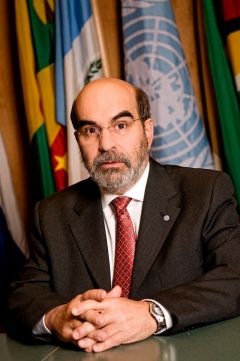FAO chief "determined but autocratic"

ROME -- In 100 days of office as FAO Director General José Graziano da Silva has impressed staff by his determination to turn around the UN agency but raised questions over an "autocratic" style.
"Graziano is really trying to get things moving," one senior FAO finance official told Italian Insider, speaking on condition that he not be named. "There's no comparison with the stasis under his predecessor, Jacques Diouf, who was just treading water." Senor Graziano told his inaugural press conference in January that eradicating hunger was the organisation’s core mandate, and that he aims to halve the proportion of people living in hunger and extreme poverty by 2015. Graziano told journalists then that with a term in office of only three and a half years, and such an ambitious target to reach in that period, there was "no time to lose." He said he would distribute resources unequally, giving more to the most needy countries, in particular focusing on the Horn of Africa, which he will visit later in the year.
The vibrations from the top office floor of the former Italian Colonies building suggest Senor Graziano is fighting to keep his pledge, insiders say. "It helps a lot that he has a big country like Brazil backing him," one added. "Diouf was at loggerheads with the head of state of his native Senegal. But even if he hadn't been Brazil can bring far more resources to bear to make Graziano's term have an impact. It's evidently really important to Rio di Janeiro that he succeed."
While Senor Graziano is widely seen as a vast improvement over Diouf's sedate 18 year reign, veteran executives say that staff still have some trepidation dealing with the new DG, even if it is not as acute as under Diouf, who had a reputation for ruling by fear and being remote. "Graziano has an autocratic leadership style," said one senior staffer, who spoke on condition of anonymity. "The only negative side to him we've seen so far is a tendency to yell at people when he gets mad. You would think he knew that shouting at subordinates is considered bad management practice these days. Otherwise he is a vast improvement. Of course it would have been difficult to find anyone who wasn't better than the man in charge before."
"Graziano is at a disadvantage because he worked mainly in the field before," the source added, "so he is not so familiar with headquarters here in Rome. That means he doesn't suffer fools gladly. On the other hand it's good for people working in the field, he knows how they feel, understands their concerns."
Though he stated that the number of hungry was likely to rise in the coming years due to economic instability and unemployment, Graziano in January was optimistic that more countries are expressing a will to combat hunger, and recognise that "it is cheaper to eradicate hunger than to live with it."
He predicted that volatile food prices will continue in 2012, but also stated that he thought it likely that food prices will neither rise nor fall by any drastic amount as they have done in recent years.
He did warn, however, that the level of hunger faced is "dramatic, we are talking about one in seven people," and said that production must be increased this year if there are to be adequate food reserves for 2013.
The Director-General emphasized that he will strive to increase FAO’s efficiency by cutting administrative costs: "We must look for savings in the Head Quarters and bureaucracy, the non-productive area of the organisation."
He was also keen to decentralise the organisation, and be involved at more local levels saying that his experience with the highly successful Hunger Zero initiative in Brazil was that there is "no general formula or silver bullet that can kill hunger. Actions need to be adapted to local conditions."
Emphasis was also placed on the need to value local products and cut down on "long voyages, great waste and long periods of storage."



